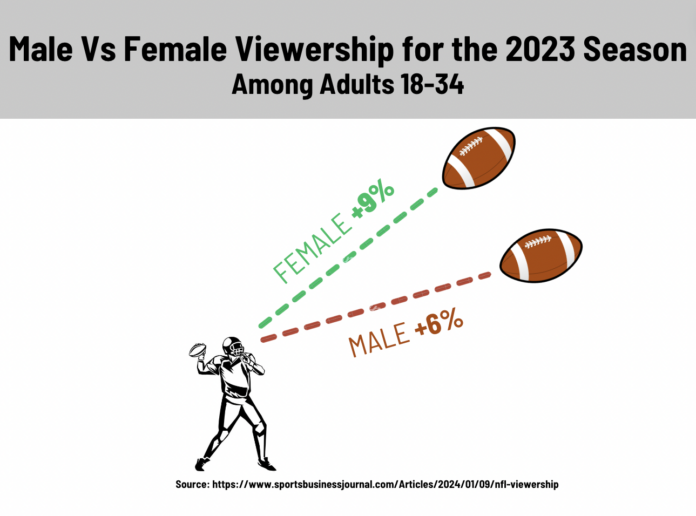Tailgating, cheering, seeing your favorite players in person or on a screen, the pride you feel when your team scores: All of these things are exciting parts of being a sports fan, or at least they should be. But for some female sports fans, joining in the enthusiasm of watching or talking about sports means enduring demeaning comments or accusations of being a fake fan.
Taylor Swift’s appearances at last season’s NFL games to cheer on her boyfriend Travis Kelce increased the number of women watching football, a phenomenon that became known as the “Swift Effect.” However, many of the fans that are watching have not just started watching because of Swift, but because they have a real interest in the game. A headline from the Daily Beast read, “Taylor Swift and Travis Kelce are Forcing Girls To Care About Football.” Although there is a high percentage of female sports fans, this does not prevent them from being patronized, even when they may be extremely knowledgeable and have experience in athletics. The idea of women not being seen as true fans is not new, though, as women have frequently felt unwelcome in the stands.
Phoebe Unger ‘24 is an avid Milwaukee Bucks fan and has faced criticism in the past. “Whenever I say that I am a fan of the Bucks, especially to guys, they always make fun of me,” Unger says. “They always say I know one player when I really know the whole team. They also mansplain terms to me as if I don’t know anything.”
Unfortunately, Unger is not the only one. Surveys found that 20 percent of female respondents said they were called a “fake fan,” while 60 percent of NFL fans said they have experienced someone “mansplaining” the game.
While women make up a large portion of fans, 55 percent of female fans would rather watch games at home rather than in person or at sports bars, likely because they feel unwelcome or unsafe at sporting events. In addition, 30 percent of female NFL fans reported experiencing disrespect at games. This could be from not being taken seriously, and being quizzed on their knowledge of the game.
The feelings of exclusion for women in male-dominated activities are not exclusive to sports, as women have also been struggling to feel included in online gaming spaces. For example, Gamergate was an “internet culture war” where independent game-makers and critics, mostly women, advocated for inclusion in gaming, while others were pushing for the more stereotypical gamers to still be in control. Many female gamers received highly graphic and disturbing threats and were attacked on these online platforms. The website Breitbart described Gamergate with the headline, “Feminist bullies tearing the video game industry apart.”
On social media platforms, such as TikTok, women are speaking out about their experiences of being fans. One TikTok user under the name Sweetannieod made a video called “Things girls who love sports are TIRED of hearing.” In the video, Annie discusses how women get quizzed to prove their knowledge of the sport, being mansplained about the sport, and saying that girls only like the sport or team because the players are attractive.
In the comments of the video, other TikTok users talk about their own experiences and even use satire to prove the severity of toxicity in the sports fanbase as a relevant problem. One user comments, “Ok, but if he’s your favorite player what’s his blood type and social security number?” and other users comment back with, “Oh, you don’t know? Then you’re a FAKE FAN and BANDWAGON!”
The Detroit Pistons left a positive comment, saying, “You don’t need to prove anything to us,” with a red heart emoji. Teams such as the Detroit Pistons give women in sports fan bases hope that they can enjoy the sport without being questioned by men to prove their fandom.
Whether it is sports or online gaming, women can be seen as “others” when it comes to male-dominated spaces, but they have turned to social media to reclaim their place as fans.
Women in the sports fan community fear that they will always be faced with misogynistic and sexist comments when it comes to liking a sport. Talking about their own experiences and the toxicity in the sports fanbase can bring recognition to the problem.
But the truth of the matter is this; it is okay not to know the entire lineup of the 2009 Dallas Cowboys. It is okay not to know who won the 2005 MLB World Series. It is okay not to know some of the players. It is okay not to know everything about a male-dominated sport.
However, it is not okay to make one feel lesser than you for asking a question. It is not okay for you to question someone else’s true fandom when they show interest in the sport. And it is not okay to do these things to a woman when you would not do this to a man.
So, instead of excluding and criticizing women for becoming a fan of your sport or team, be excited that your sport and team is growing in numbers in its fanbase. Be excited to have someone new to talk about this similar interest. Be excited about being a part of a community that should be welcoming.






















